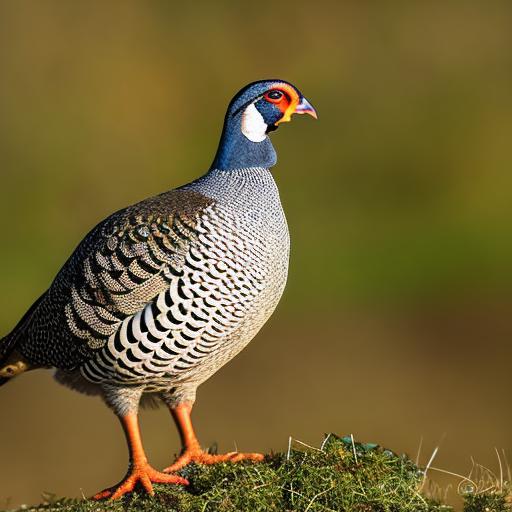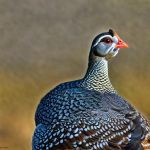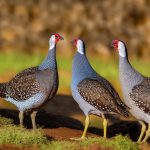Guinea fowl, also known as pintades, are a type of game bird native to Africa. They are popular for their unique appearance and their ability to control pests in the garden. Guinea fowl are known for their distinctive call, which can be quite loud and can serve as a natural alarm system. They are also valued for their delicious, lean meat and their ability to lay eggs with rich, flavorful yolks. Guinea fowl are social birds that thrive in small flocks, and they are relatively low-maintenance compared to other poultry species. They are hardy and adaptable, making them a great addition to a homestead or small farm.
Guinea fowl come in a variety of colors, including pearl, lavender, and white, and they have a striking spotted or striped plumage. They are known for their keen foraging abilities and can help control insect populations in the garden. Guinea fowl are also excellent at alerting their owners to potential threats, making them a valuable addition to a farm or homestead. While they can be a bit skittish around humans, with proper handling and care, guinea fowl can become quite tame and even enjoy human interaction. Overall, guinea fowl are an interesting and beneficial addition to any small farm or homestead.
Key Takeaways
- Guinea fowl are hardy and low-maintenance birds that are great for pest control and as a source of meat and eggs.
- Creating a suitable environment for guinea fowl involves providing a secure coop or shelter, ample space to roam, and protection from the elements.
- Proper nutrition for guinea fowl includes a balanced diet of commercial feed, fresh water, and access to insects, seeds, and greens.
- Protecting guinea fowl from predators requires securing their coop, using guard animals, and providing adequate lighting and fencing.
- Ensuring proper health and veterinary care for guinea fowl involves regular check-ups, vaccinations, and prompt treatment of any illnesses or injuries.
- Managing breeding and reproduction of guinea fowl includes providing nesting boxes, monitoring mating behavior, and caring for chicks.
- Tips for handling and training guinea fowl include gentle handling, positive reinforcement, and providing a routine for feeding and care.
Creating a Suitable Environment for Guinea Fowl
When it comes to creating a suitable environment for guinea fowl, there are several key factors to consider. First and foremost, guinea fowl require a secure and spacious coop or housing area to protect them from predators and the elements. The coop should be well-ventilated and provide enough space for the birds to roost comfortably at night. Additionally, guinea fowl are known for their strong flying abilities, so it’s important to have a covered run or fenced area to prevent them from flying away or becoming prey to predators.
In terms of bedding, guinea fowl prefer a dry and clean environment, so providing them with ample straw or wood shavings is essential. It’s also important to provide them with access to fresh water and a balanced diet to ensure their health and well-being. Lastly, guinea fowl thrive in a natural environment with plenty of space to roam and forage for insects and plants. Providing them with access to a large outdoor area will not only keep them happy and healthy but also help control pests in the surrounding area. Overall, creating a suitable environment for guinea fowl involves providing them with a secure and spacious living space, access to fresh water and a balanced diet, and plenty of room to roam and forage.
Providing Proper Nutrition for Guinea Fowl
Proper nutrition is essential for the health and well-being of guinea fowl. These birds are natural foragers and enjoy a diet that consists of insects, seeds, plants, and grains. In addition to their natural foraging habits, it’s important to provide guinea fowl with a balanced commercial feed that is specifically formulated for game birds. This feed should contain essential nutrients such as protein, vitamins, and minerals to support their overall health and egg production.
In addition to commercial feed, guinea fowl can also benefit from supplemental treats such as fruits, vegetables, and mealworms. It’s important to monitor their intake of treats to ensure they are still receiving a balanced diet. Providing access to fresh water at all times is also crucial for the health of guinea fowl. In addition to their diet, it’s important to provide grit or small stones for guinea fowl to aid in digestion. Overall, providing proper nutrition for guinea fowl involves offering a balanced commercial feed, supplemental treats in moderation, access to fresh water, and grit for digestion.
Protecting Guinea Fowl from Predators
Protecting guinea fowl from predators is essential for their safety and well-being. Guinea fowl are vulnerable to a variety of predators including foxes, raccoons, hawks, and even domestic dogs. To protect guinea fowl from these threats, it’s important to provide them with a secure coop or housing area that is predator-proof. This means using sturdy fencing or wire mesh to prevent predators from gaining access to the birds.
In addition to securing their living space, it’s important to provide guinea fowl with a covered run or fenced area to prevent them from flying away or becoming prey to aerial predators such as hawks. It’s also important to be mindful of potential threats during free-ranging time and supervise the birds when they are outside of their enclosed area. Providing guinea fowl with a safe and secure environment will help protect them from predators and ensure their safety and well-being.
Ensuring Proper Health and Veterinary Care for Guinea Fowl
Ensuring proper health and veterinary care for guinea fowl is essential for maintaining their well-being. Like all animals, guinea fowl are susceptible to various health issues such as parasites, respiratory infections, and injuries. It’s important to monitor the health of guinea fowl regularly and seek veterinary care if any issues arise. In addition to regular health checks, it’s important to provide guinea fowl with a clean living environment, access to fresh water, and a balanced diet to support their overall health.
Preventative measures such as vaccinations and parasite control can also help maintain the health of guinea fowl. It’s important to work with a veterinarian who has experience with poultry to ensure that guinea fowl receive proper care and treatment when needed. Overall, ensuring proper health and veterinary care for guinea fowl involves regular health checks, preventative measures such as vaccinations and parasite control, and seeking veterinary care when necessary.
Managing Breeding and Reproduction of Guinea Fowl

Managing the breeding and reproduction of guinea fowl requires careful planning and consideration. Guinea fowl are known for their strong breeding instincts and can reproduce quickly under the right conditions. If breeding is desired, it’s important to provide guinea fowl with a suitable nesting area that is secluded and secure. Guinea hens will lay eggs in the nesting area, and it’s important to collect the eggs regularly if breeding is not desired.
If breeding is desired, it’s important to provide the necessary care for the eggs and chicks once they hatch. This includes providing a warm and safe environment for the chicks to grow and ensuring they have access to proper nutrition and veterinary care as needed. It’s also important to consider the potential challenges of managing a growing flock if breeding is pursued. Overall, managing the breeding and reproduction of guinea fowl involves careful planning, providing suitable nesting areas, collecting eggs if breeding is not desired, and providing proper care for chicks if breeding is pursued.
Tips for Handling and Training Guinea Fowl
Handling and training guinea fowl requires patience and consistency. Guinea fowl can be skittish around humans but can become quite tame with regular interaction. It’s important to approach guinea fowl calmly and gently when handling them to build trust over time. Providing treats such as mealworms can also help encourage positive interactions with guinea fowl.
When it comes to training guinea fowl, it’s important to establish routines and use positive reinforcement techniques. For example, using treats or praise when they come when called can help reinforce desired behaviors. It’s also important to be mindful of their natural instincts such as foraging and roosting when training them. Overall, handling and training guinea fowl involves patience, consistency, positive reinforcement techniques, and understanding their natural instincts.
In conclusion, guinea fowl are unique and beneficial birds that can make a valuable addition to a small farm or homestead. Creating a suitable environment for guinea fowl involves providing them with a secure living space, access to fresh water, a balanced diet, and plenty of room to roam and forage. Protecting guinea fowl from predators requires securing their living space and supervising them during free-ranging time. Ensuring proper health and veterinary care involves regular health checks, preventative measures such as vaccinations and parasite control, and seeking veterinary care when necessary. Managing the breeding and reproduction of guinea fowl involves careful planning, providing suitable nesting areas, collecting eggs if breeding is not desired, and providing proper care for chicks if breeding is pursued. Handling and training guinea fowl requires patience, consistency, positive reinforcement techniques, and understanding their natural instincts. Overall, with proper care and attention, guinea fowl can thrive and provide valuable benefits to their owners on the farm or homestead.
If you’re looking for tips on how to keep guinea fowl on your property, you’ll want to check out this insightful article on when guinea fowl lay eggs. Understanding the breeding and egg-laying habits of guinea fowl is essential for successfully raising them on your property. This article provides valuable information that can help you create a suitable environment for these unique birds.
FAQs
What are guinea fowl?
Guinea fowl are a type of bird that are native to Africa. They are known for their distinctive spotted feathers and loud, chattering calls.
Why would someone want to keep guinea fowl on their property?
Guinea fowl are often kept on properties for their pest control abilities. They are known for eating insects, ticks, and other pests, making them a natural and effective form of pest control.
How do you keep guinea fowl on your property?
To keep guinea fowl on your property, it’s important to provide them with a secure and spacious coop or shelter to protect them from predators and the elements. Additionally, providing them with access to a large outdoor area to roam and forage is important for their well-being.
What do guinea fowl eat?
Guinea fowl are omnivores and will eat a variety of foods including insects, seeds, grains, and small rodents. It’s important to provide them with a balanced diet to ensure their health and well-being.
Are guinea fowl noisy?
Yes, guinea fowl are known for being noisy birds. They have a loud, chattering call that can be disruptive, especially in large numbers. It’s important to consider the noise factor when deciding to keep guinea fowl on your property.
Meet Walter, the feathered-friend fanatic of Florida! Nestled in the sunshine state, Walter struts through life with his feathered companions, clucking his way to happiness. With a coop that’s fancier than a five-star hotel, he’s the Don Juan of the chicken world. When he’s not teaching his hens to do the cha-cha, you’ll find him in a heated debate with his prized rooster, Sir Clucks-a-Lot. Walter’s poultry passion is no yolk; he’s the sunny-side-up guy you never knew you needed in your flock of friends!







